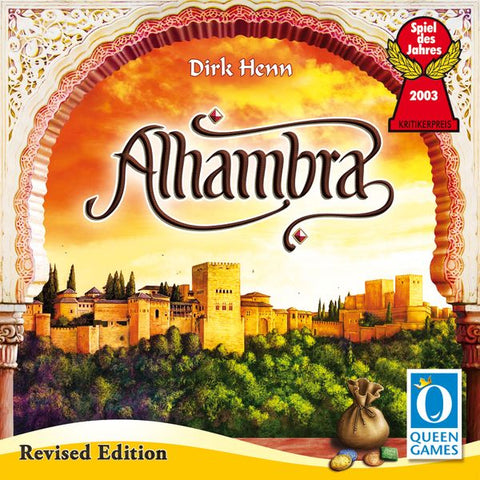
Alhambra (Revised Edition)
Card and Tile Game, 2-6 players, ages 8 & up.
Winner of the prestigious 2003 Spiel des Jahres (German Game of the Year)
In Granada, one of the most impressive building projects of the Middle Ages has begun: the construction of Alhambra. A palace, fortress, and a small city - all in one - Alhambra is made up of the world's most beautiful gardens, pavilions, chambers and towers. In the middle ages, the Moors in Spain enjoyed the most advanced civilization in Europe. That included beautiful palaces such as the famous Alhambra. Players try to build their Alhambra to gain points. Tough choices come from having more choices than you can do in a turn. Alhambra is a tile playing game, but you have to buy them with money instead of the random drawing of many games. It's a popular game with enthusiastic reviews and prestigious awards.
++++++++++++++++++++
Counter Magazine review
++++++++++++++++++++
2-6 players, 60 minutes
designed by Dirk Henn
reviewed by Ben Baldanza
That Alhambra won this year's Spiel des Jahres was not a surprise once it was identified as a top-three finalist. But prior to the voting, I would have had a hard time believing that the game would reach that lofty position. It is not a bad game by any stretch, but it is a direct derivative of the earlier Stimmt So and Al Capone games while adding some nice touches that clearly will appeal to both families and gamers alike.
Instead of buying Aunt Emma's stock certificates, this time players buy tiles showing buildings of six different styles in order to create their own Alhambra. The tiles are purchased in the Stimmt So format, meaning that the proper currency (from four types) must be used and if the player pays the exact price they can continue their turn. Once the ``master turn'' is over, meaning that everything purchased is completed, the player must either add the tiles to their Alhambra using specified placement rules or put them into a reserve for later placement.
Also following its original, there are three scoring sessions and in each players score for their relative strength in each of the six building types. In the first scoring, only the lead player scores, in the second the first two score, and in the third the top three score. Only tiles that have been built into your personal Alhambra count for the scoring, so although keeping tiles in reserve can be a good strategy, it is one that must be used wisely else the value of the tiles will be lost.
Building the Alhambra is the new addition to the game, and this adds both a nice strategic element but unfortunately also a lot of down time. Each player begins with a central tile and all tiles laid must connect to this via a series of connected courtyards. The tiles have zero, one, two, or three walls on them and walls score when framing the outside of your city. When scoring happens, each player's longest connected wall scores one point per section, and this can be substantial. Interior walls do not score and they cannot be placed against the courtyard. Thus, choosing tiles to buy requires not only the evaluation of your relative standing by building type, but also how the tile will fit onto your display. This is what makes the down-time happen, as it takes longer for each player to decide what to buy and more importantly they then have to spend time orienting things properly in their display. In Stimmt So, you only need to think about the type of stock and then just stack it with the rest, so it plays much faster.
Money cards are available in the four currency types and in various values. When you take money, you can take any of the cards available. But in a very nice enhancement, you are also allowed to take multiple money cards as long as their total is not greater than five. Anyone who has played Stimmt So knows the frustration of having one's and two's available to you, then the card is refilled with a nine for the next guy. The multiple money card draw makes this much less of a problem.
On a turn, then, players can take money, purchase and place tiles, or change their Alhambra. Buying a building at its exact price gets you the choice of these three actions again, so theoretically you could buy four buildings in a turn and still take money. Tiles placed on the reserve, rather than the display, require an action to recover. The ``change Alhambra'' action allows a player to move from the reserve to the Alhambra, remove a previously placed tile to the reserve (most likely for a revised wall strategy), or to exchange a placed tile with one from the reserve. This also adds to the strategy but increases the downtime.
The result is an interesting game that takes too long. All of the mechanics work well and this basic design has evolved well with the placement and building addition. But the downtime is a serous drawback since while your turn is more interesting, everyone else's seems to drag. The Queen/Dirk Henn connection continues to produce good output and Alhambra is a nice addition to their line, but consider yourself warned about the downtime.





